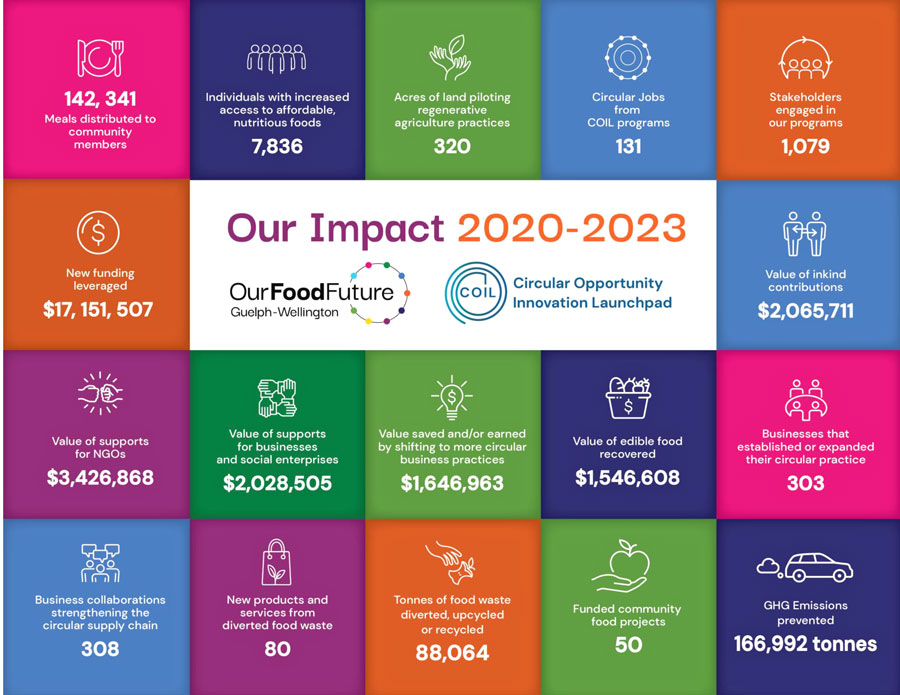GUELPH – The initial funding that launched it is winding down, but the Our Food Future project will have lasting impacts, and has attracted a global summit on circular economy to the Guelph/Wellington region.
During an update at a June 29 county council meeting, Wellington County Smart Cities project manager Justine Dainard told council the program has exceeded its original goals, and staff is working on a plan to keep key elements of the program going.
In May 2019, the City of Guelph and the county were awarded $10 million in funding from Infrastructure Canada’s Smart Cities Challenge to create Canada’s first circular food economy.
In January 2020, the city and county officially launched Our Food Future, with goals of reimagining how the community produces, distributes, sells and consumes food.
“So as you’ll recall, we were tasked with a 50/50/50 by 2025 goal,” said Dainard.
The goal was a 50 per cent increase in access to nutritious food, creation of 50 new circular businesses and collaborations, and a 50% increase in economic benefit by unlocking the value of waste, all by the year 2025.
“We were addressing circular economy of food in our region, looking at waste as a resource, access to nutritious foods, and building up circular businesses. We are pleased to report that we will certainly not only meet, but probably exceed, our targets by the end of this year, 2023,” Dainard stated.
Through projects such as Food Equity with Dignity, a partnership with Guelph Neighbourhood Support Coalition, Our Food Future has increased affordable food access for close to 8,000 individuals, funded 50 community projects, distributed more than 140,000 meals to community members and recovered edible food valued at more than $1.5 million.
Another program, Groceries from the SEED, is a grocery boxing and delivery service which operates in Guelph and Centre Wellington.
“During COVID, they did an incredible job getting emergency and free meals out to people. And now they are supporting so many of our food access points in a hub and spoke model,” said Dainard.
The creation of 50 new businesses or collaborations has been overshot, with more than 300 new businesses “that we’ve been a part of helping create,” said Dainard.

County of Wellington Agenda image
A project, funded by the Cooperators, to separate construction waste at building sites has also been a success, she pointed out.
“That’s tracking the kind of waste that happens when you build a house,” she explained, noting there is currently “an incredible focus on new construction of housing.
“The general rule of construction waste is that for every five or six wood frame houses, there’s enough waste to build an additional house. And we can only make use of that waste by source-separating those things before they go in to their next life,” she explained.
Dainard told councillors “the bottom line is the climate impact.
“We’ve been tracking our greenhouse gas (GHG) reductions from either keeping food out of landfill, or rescuing food in the first place, or recreating things from something that would otherwise be wasted,” she said, pointing out GHG reductions achieved through the program so far are roughly equivalent to taking 36,000 cars off the road for a year.
David Messer, executive director of the Guelph Smart Cities office, said “communities around the world have been really excited and inspired by this work.
“The program has grown our regional reputation for innovation and leadership on sustainability and climate and really helped us punch well above our weight for our region in rural Ontario,” he stated.
In May the Federation of Canadian Municipalities (FCM) released a guidebook for municipalities on how to “catalyze a circular economy” in local communities, said Messer, who noted the project is connected to a new FCM Green Municipal Program “which is based entirely on our example here.”
This past spring, said Messer, the local Smart Cities team was invited by the Ellen MacArthur Foundation, a leading global authority on circular economy, to speak on a panel at the World Circular Economy Forum in Finland.
Members of the group also helped plan, moderate and present several of the sessions at the first-ever Canadian circular economy summit in Toronto in June.
“We can also say that our Smart Cities models are being picked up by other communities across the country that are building on our example directly,” said Messer.
“We’re currently working with the National Zero Waste Council on an Environment Canada-funded project with Halifax Regional Municipality to recreate the circular food system that we started here back in 2018,” he noted.
Dainard announced that Guelph has been selected as the site for the first North American Circular Economy Hotspot gathering in June of 2024. The international event is expected to bring over 400 circular economy leaders from around the world to the area.
The multi-day conference will be headquartered at the University of Guelph in consultation with city and county economic development departments.
“The Circular Economy Hotspot series started about five years ago in Europe and has since become a global event. So, we’re very pleased to be the very first North American site to host this kind of event,” said Dainard.
Messer said the Smart Cities team is looking at the next phase of the project.
“From the city side, with the successful conclusion of the grants from Fed Dev and Infrastructure Canada this December, the Smart Cities office for Guelph will be closing. Circular economy will remain a priority for the city, lead through the solid waste resources department as well as economic development,” he explained.
Dainard said the Wellington County Smart Cities office will remain open and she will be presenting a work plan in the fall to determine how to “keep the things that matter most to us going and continue to work on some really essential pieces with our community partners.”
Messer told council a wrap up celebration event is planned to mark the end of the Smart Cities projects in October and a final report will be published before December “on what we achieved together and what we can take forward.”
Councillor Doug Breen commented that this area “was the obvious place for this to happen.
“We are the center of food science in the country, and many ways in the world,” he said noting the role of the University of Guelph in food education and research.
“We’ve been integrally involved in food handling, food processing, food production, everything to do with food, here in this region since the first pioneers busted soil here, and for millennia before that,” he said.
Breen said the Smart Cities project has helped create a template for the city and county to work together on a variety of files.
“We need to climb out of our silos to start doing more things together.”
“When we get to October and we have our celebration at the end of this, this must not be a funeral. This has to be graduation. We have to move on and continue to do things like this,” he added.
Council received the report as information.




